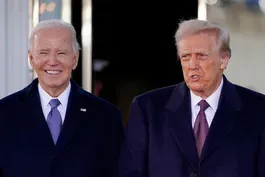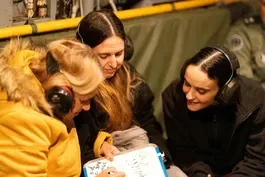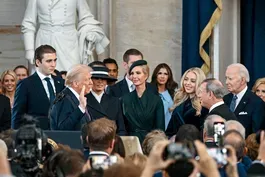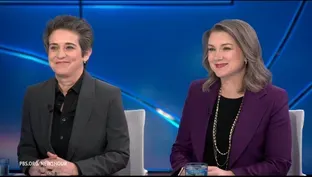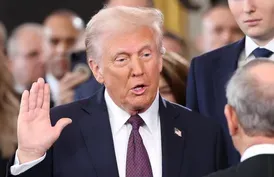
'New Prize for These Eyes' details 2nd civil rights movement
Clip: 1/20/2025 | 7m 31sVideo has Closed Captions
Juan Williams details 2nd civil rights movement in 'New Prize for These Eyes'
In 1987, journalist Juan Williams helped illuminate the Civil Rights Movement with "Eyes on the Prize," a groundbreaking book that brought history to life and became an essential chronicle of the fight for racial equality. Nearly four decades later, he returns with "New Prize for These Eyes," a powerful update looking at the 21st-century movement. Geoff Bennett discussed the work with Williams.
Major corporate funding for the PBS News Hour is provided by BDO, BNSF, Consumer Cellular, American Cruise Lines, and Raymond James. Funding for the PBS NewsHour Weekend is provided by...

'New Prize for These Eyes' details 2nd civil rights movement
Clip: 1/20/2025 | 7m 31sVideo has Closed Captions
In 1987, journalist Juan Williams helped illuminate the Civil Rights Movement with "Eyes on the Prize," a groundbreaking book that brought history to life and became an essential chronicle of the fight for racial equality. Nearly four decades later, he returns with "New Prize for These Eyes," a powerful update looking at the 21st-century movement. Geoff Bennett discussed the work with Williams.
How to Watch PBS News Hour
PBS News Hour is available to stream on pbs.org and the free PBS App, available on iPhone, Apple TV, Android TV, Android smartphones, Amazon Fire TV, Amazon Fire Tablet, Roku, Samsung Smart TV, and Vizio.
Providing Support for PBS.org
Learn Moreabout PBS online sponsorshipin 1987 journalist juanan Williams helped illuminate the Civil Rights Movement with eyes on the prize a groundbreaking book that brought history to life and became an essential Chronicle of the fight for racial equality that book was paired with a groundbreaking PBS documentary of the same name now nearly four decades later Williams returns with new prize for these eyes a powerful And Timely update on this MLK day that looks at the new 21st century Civil Rights Movement I recently spoke with him about it Juan Williams welcome to the newsour my pleasure Jeff thanks for having me what about this current moment inspired you to write a followup to your 1987 book eyes on the prize you know boy 1987 that's a way back almost 40 years ago yeah exactly so 40 years ago I wrote eyes on the prize America civil rights years and it was accompanying a PBS special of the same name that was a great success so now 40 years later here I am and I'm saying to you I think we're in the midst of a second Civil Rights Movement I've written a book called new prize for these eyes the rise of America's second civil rights movement and the key here is that if you think about eyes on the prize and the civil rights movement of the mid 20th century in some ways it could be summed up three words we shall overcome and then a focus there is on attaining basic rights through legislation people Marching In the Streets okay fast forward to 2025 and here we are with black lives matter and what do we see black lives matter in terms of marches well goodness gracious thousands of marches with millions of people as opposed to say even the great March on Washington with Dr King which had 250,000 people so we're seeing right now a movement that's much larger and it's 247 it's on the internet uh it's tweets it's memes it's viral messages viral images and all about living while black if you think back to the George Floyd case what really got that going was the video image of the 9 Minutes of the policeman with his knee on George Floyd's neck so in this moment I thought you know there's a lot going on here that people don't think of as a civil rights movement mhm and this movement is distinct from the first movement it's all about not passing legislation but about people gaining voice and saying this is what it's like to be black to be Latino to be a woman in this age and it's changing the way we think about America because these people are having their own voice it's a new conversation it's a new movement distinct and new but what historical patterns and parallels stand out to you well obviously I mentioned marching obviously the marches of back then Were Meant to have an impact and you see marches today so there would be some parallel there although as I pointed out to you this marches today much larger and have in some ways I think much more more impact the conversation we're having now as compared to then is not about can we pass a Civil Rights Act can we pass a Voting Rights Act can we get enough votes to do it now the conversation is and this is pushing forward what is the norm for America where are we going forward on this conversation of race is it okay to have a conversation about diversity equity and inclusion in terms of hiring how about in terms of cultural represent ation do we need to have that conversation um what about curriculum and what goes on in the schools should we be teaching people about often times disturbing even unpleasant and cruel history or is that something that's going to make children upset and we don't need to do it um do we have in the politics a real conversation Republican party right now is overwhelming a white people's party it's 80 plus% white look at the vote for Donald Trump overwhelmingly white look at the vote for KLA Harris Joe Biden strongly black we saw some decrease in terms of black men and Latino men but still it's like 80% of black and Latinos blacks anyway voted for the Democrats so yes this conversations have parallels but you see the emerging difference from that first movement one of the takeaways from the last election is that many of the efforts to advance social justice struck many Americans as too confrontational too judgmental that many of the activists and Advocates misread and miscalibrated where the American public stands on a lot of these social issues you did a lot of the writing and reporting of this book well before the election but what have you picked up in your in your conversations and and what are your takeaways on that front you know Jeff that's such a fascinating question because I'm a journalist basically I'm not an historian often times people I think you know not just a journalist but just a casual Observer of the news you lose focus because things come so quickly especially these days from so many different sources but I think that right now if you focus and say oh I see the dots connecting I see how things are impacting us you would have to say that we are moving towards a moment where that if there is a second movement there has to be a third movement because right now people seeing Donald Trump's election and seeing all the arguments that well too much of this identity politics and too much of this Dei diversity inclusion um that you'd say well how do they reinvent that Circle or that that machine I can't necessarily tell you that story but I can tell you this that based on what I've seen the politics have to change often times activists in the past have been sort of discontented with politics and politicians even a great one like Barack Obama but now they're going to have to understand what compromise means now they're going to have to start to work to build alliances now they're going to have to work to see where it is that you can reach out to the majority of trump voters and say there's common interest in understanding why the races the ethnicities come together to form one America what do you envision as the Ultimate Prize for this new movement and what does achieving it look like so you know one of the interesting things and this goes back to what we were talking about early in the conversation about media and you know so many voices emerging is the live living while black or Latino quality of it that people young people my kids your kids would have a sense you know what I have an equal opportunity in this country I don't feel put upon or stigmatized by the color of my skin or my name being foreign sounding or anything like that I think that that is the prize is that you would say in America it doesn't matter who you are where you came from if you have the heart and the drive and the mind you and the spirit you can do it the common Humanity I think that remains the prize the book is new prize for these eyes the rise of America's second Civil Rights Movement Juan Williams it's great to have you here thanks for thanks for having me as you know eyes on the prize was a PBS product so I am so pleased to be here a full circle moment I tell you [Music]
Biden issues preemptive pardons on his way out of office
Video has Closed Captions
Biden issues preemptive pardons on his way out as Trump says he'll pardon Jan. 6 rioters (6m 11s)
News Wrap: 3 Israeli hostages released as ceasefire holds
Video has Closed Captions
News Wrap: 3 Israeli hostages released as ceasefire appears to be holding (4m 18s)
The power of presidential executive orders and their limits
Video has Closed Captions
The power of presidential executive orders and their limits (4m 29s)
Stoltenberg on how the world is responding to Trump's return
Video has Closed Captions
Former NATO chief Stoltenberg on how the world is responding to Trump's return (6m 6s)
Tamara Keith and Amy Walter on how Trump changed Washington
Video has Closed Captions
Tamara Keith and Amy Walter on how Trump and Washington have changed since his first term (6m 2s)
Trump returns to office and kickstarts ambitious agenda
Video has Closed Captions
Trump returns to office and kickstarts ambitious and controversial agenda (16m 52s)
Providing Support for PBS.org
Learn Moreabout PBS online sponsorshipMajor corporate funding for the PBS News Hour is provided by BDO, BNSF, Consumer Cellular, American Cruise Lines, and Raymond James. Funding for the PBS NewsHour Weekend is provided by...

